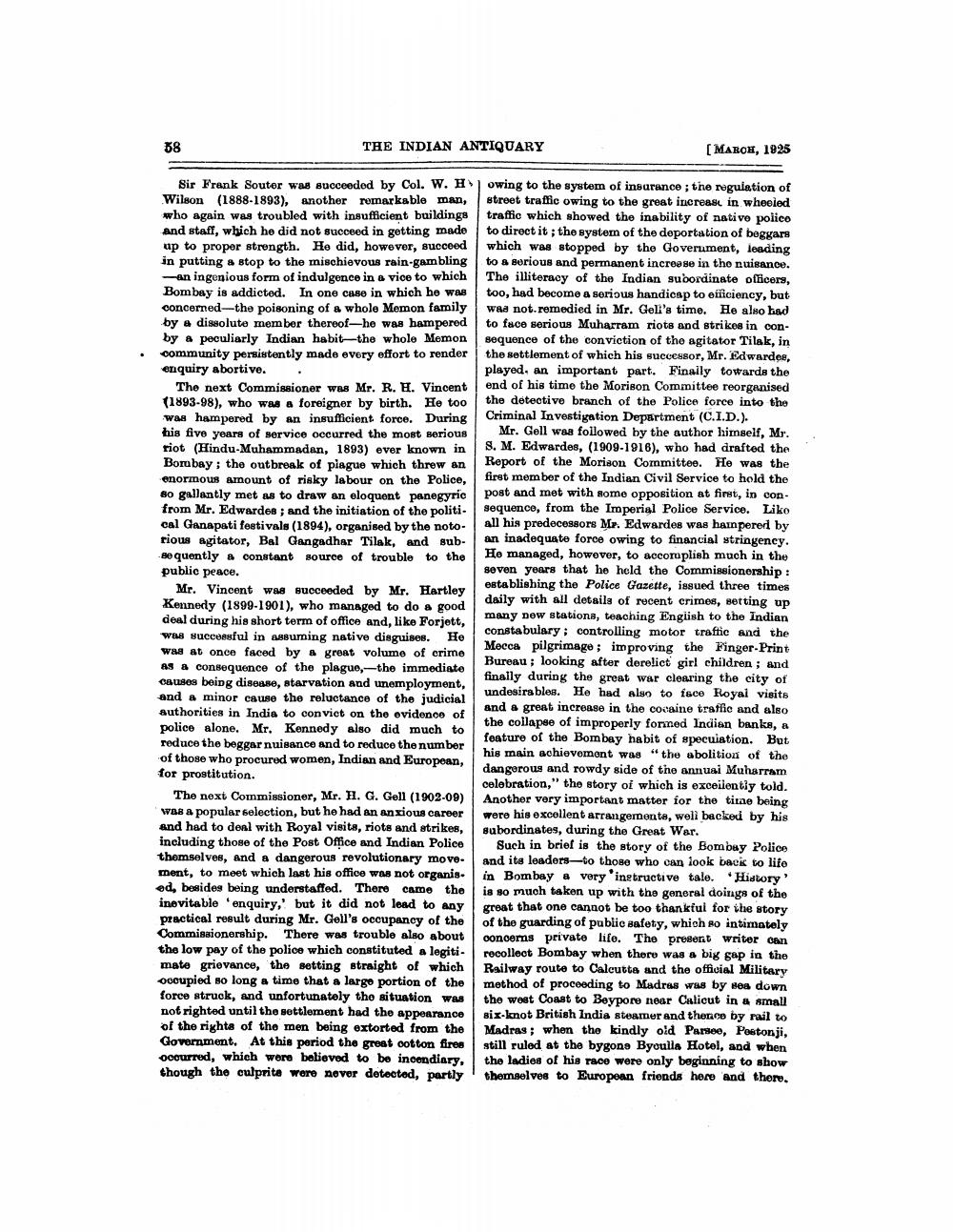________________
88
THE INDIAN ANTIQUARY
[MARCH, 1925
Sir Frank Soutor was succeeded by Col. W. H owing to the system of insurance; the regulation of Wilson (1888-1893), another remarkable man, street traffic owing to the great increase in wheeled who again was troubled with insufficient buildings traffic which showed the inability of native polico and staff, which he did not succeed in getting made to direct it; the system of the deportation of beggars up to proper strength. He did, however, succeed which was stopped by the Goverument, leading in putting & stop to the mischievous rain-gambling to & serious and permanent increase in the nuisance.
an ingenious form of indulgence in a vice to which The illiteracy of the Indian subordinate others, Bombay is addicted. In one case in which he was too, had become a serious handicap to efficiency, but concerned-the poisoning of a whole Memon family waa not.remedied in Mr. Geli's time. He also had by a dissoluto member thereof-he was hampered to face serious Muharram riots and strikes in conby a peculiarly Indian habit the whole Memon sequence of the conviction of the agitator Tilak, in community persistently made every effort to render the settlement of which his successor, Mr. Edwardee, enquiry abortive. .
played. an important part. Finally towards the The next Commissioner was Mr. R. H. Vincent end of his time the Morison Committee reorganised (1893-98), who was a foreigner by birth. He too the detective branch of the Police force into the was hampered by an insufficient force. During
Criminal Investigation Department (C.I.D.). his five years of service occurred the most serious
Mr. Gell was followed by the author himself, Mr. riot (Hindu-Muhammadan, 1893) ever known in
S. M. Edwardes, (1909-1916), who had drafted the Borubay; the outbreak of plague which threw en
Report of the Morison Committee. He was the enormous amount of risky labour on the Police,
first member of the Indian Civil Service to hold the 80 gallantly met as to draw an eloquent panegyric
post and met with some opposition at first, in con from Mr. Edwardes; and the initiation of the politi.
sequence, from the Imperial Police Service. Liko cal Ganapati festivals (1894), organised by the noto
all his predecessors Mr. Edwardes was hainpered by rious agitator, Bal Gangadhar Tilak, and sub
an inadequate force owing to financial stringency. sequently a constant source of trouble to the
Ho managed, however, to accomplish much in the public peace.
seven years that he held the Commissionership:
establishing the Police Gazette, issued three times Mr. Vincent was succeeded by Mr. Hartley
daily with all details of recent crimes, setting up Kennedy (1899-1901), who managed to do a good
many now stations, teaching English to the Indian deal during his short term of office and, like Forjett,
constabulary: controlling motor traffic and the WAS successful in A8Burning native disguises. Ho
Mecca pilgrimage ; improving the Finger-Print was at once faced by & great volume of crime
Bureau ; looking after derelict girl children ; and as a consequence of the plague--the immediate
finally during the great war clearing the city of causes being disease, starvation and unemployment,
undesirables. He had also to face Royal visits and a minor cause the reluctance of the judicial
and a great increase in the cocaine traffic and also authorities in India to convict on the ovidence of
the collapse of improperly forned Indian banks, a police alone. Mr. Kennedy also did much to
feature of the Bombay habit of specuiation. But reduce the beggar nuisance and to reduce the number
his main achievement was "the abolition of the of those who procured women, Indian and European,
dangerous and rowdy side of the annuai Muharram for prostitution.
celebration," the story of which is exceilently told. The next Commissioner, Mr. H. G. Gell (1902-09) Another very important matter for the time being was a popular selection, but he had an anxious career were his excellent arrangements, well backed by his and had to deal with Royal visite, riots and strikes, subordinates, during the Great War. including those of the Post Office and Indian Police Such in brief is the story of the Bombay Police themselves, and a dangerous revolutionary move. and its leaders-to those who can look bacis to life ment, to meet which last his office was not organis. in Bombay a very 'instructive tale. «History' ed, besides being understaffed. There came the is so much taken up with the general doings of the inevitable 'enquiry, but it did not lead to any great that one cannot be too thankful for the story practical result during Mr. Gell's occupancy of the of the guarding of public safety, which to intimately Commissionership. There was troublo also about concerns privato life. The present writer can the low pay of the police which constituted a legiti-l recolleot Bombay when there was a big gap in the mato griovance, the setting straight of which Railway route to Calcutta and the official Military occupied so long a time that a largo portion of the method of proceeding to Madras was by ses down force struok, and unfortunately the situation was the west Coast to Beypore near Calicut in a small not righted until the settlement had the appearance six-knot British India steamer and thence by rail to of the rights of the men being extorted from the Madras; when the kindly old Pantee, Postoji, Government. At this period the great cotton fires still ruled at the bygona Byoulls Hotel, and when occurred, which were believed to be incondiary, the ladies of his race were only beginning to show though the culprite were novor detected, partly themselves to European friends here and there.




